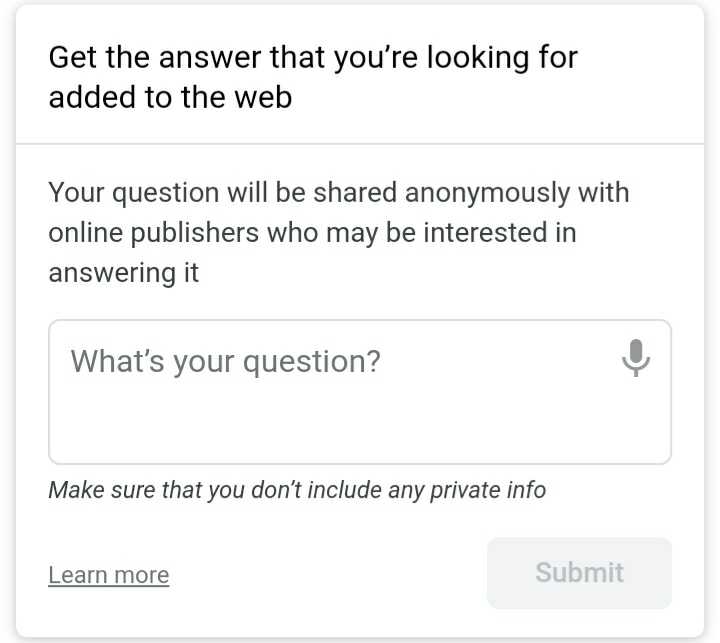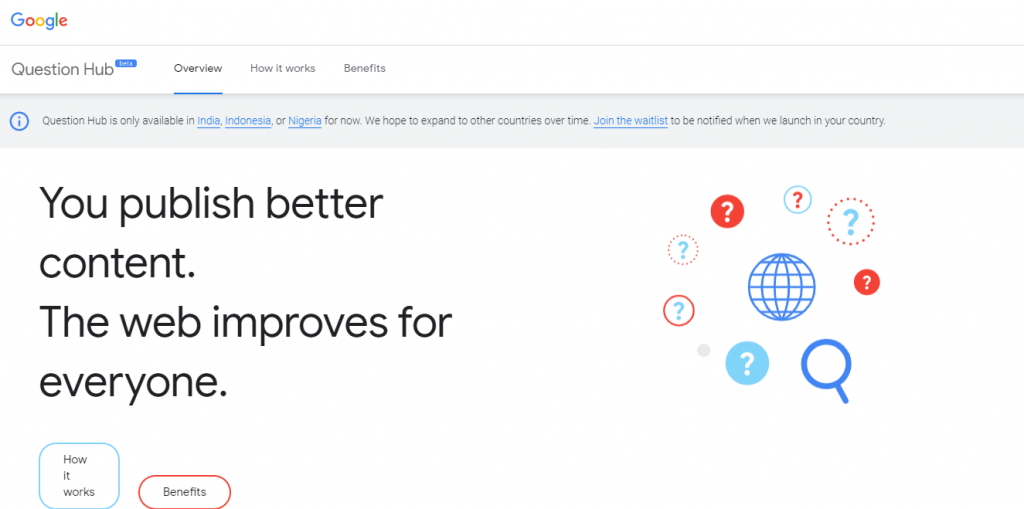Content Generation with Google Question Hub: Brief Overview of the Beta Tool
 In the world of search, Google is at the forefront of delivering results in the form of fresh content for people seeking answers. With thousands and even millions of search results, you may think that each question in the world can be supplied with the answer to satisfy it. Enter, Google Question Hub.
In the world of search, Google is at the forefront of delivering results in the form of fresh content for people seeking answers. With thousands and even millions of search results, you may think that each question in the world can be supplied with the answer to satisfy it. Enter, Google Question Hub.
A beta tool that would prove to be useful for information seekers and content creators in the digital sphere. According to its self-definition, it is “a tool that can enable creators or bloggers to generate richer content by leveraging unanswered questions.”
It seeks to be an area where people can have an exchange based on the questions that cannot be found in the Google search engine pages. With this tool at their disposal, it would be possible for people to seek more in terms of information and not just rely on the blue links. If you are a webmaster pushing for meaty content, then you should read how Google Question Hub can help you do just that.
Get the answer that you’re looking for added to the web
Now that we’re on the topic of Google Question Hub, I think it is also right that we talk about this SERP feature that Google has been testing.
As a search engine giant, Google readily acknowledges that even its algorithms are vulnerable to pieces of inadequate content. Asking people to participate in bulking up the process and information is a nod to the power of human intervention when it comes to search. This is evidenced by their Quality Raters and the ongoing testing of the box asking people to manually put a question in the box found together with the search results.
It encourages users to ask questions to “Get the answer you’re looking for added to the web”. During May of last year, Manashjyoti Athparia posted in the Gulshan Kumar Forums about his encounter with this test section. I have also seen this in my recent searches and the question box looks like this:

Using this, users initiate an exchange between them and those who would want to try their shot at answering a query. Be that as it may, Google says that they collect user questions using a variety of methods, so I think it’s safe to say that collecting user queries is not limited to this.
Content Generation with Google Question Hub
This tool is still not available in the Philippines but it is one of the tools that is getting its fair share of anticipation. Deriving topics from user questions solidifies the role of user search intent because seeing their queries in real-time assures you what information your target market is expecting to see from your niche.
According to Google, the benefits of the tool can be summarized in three steps:
- Find the right questions
- Create richer content
- Track your impact
To get you started, you just need two things: a Google account and access to your Google Search Console.
According to the official Google India blog, “To access Question Hub, publishers need to link their account to verified properties in Search Console. For publishers without a Search Console account, other options are available. Once they’ve created an account, they can explore topics relevant to their work by either searching for keywords or browsing categories. Once a topic is added, they can view unanswered questions asked by real people. Publishers can then use their editorial judgment to review unanswered questions, and expand on them when creating content.”
Additionally, you can see how well your content is performing because you can track how well your content is doing by receiving feedback from your audience. By taking a more personalized approach to answering user questions, you get to stay ahead of your competition in terms of content relevance.
What does this mean for Google Question Hub?

Currently, Google Question Hub is still on its beta-testing stage with its availability limited to only residents of India, Indonesia, and Nigeria. They have stated that they are hoping to expand to other countries as the tool reaches its maturity. Going into the site, you will be welcomed by an animation as well as the words, “You publish better content. The web improves for everyone.”
For bloggers and other content creators alike, it is essential to be keen on creating insightful and informative topics for their audience. What if you can explore topics with the help of Google? And not just any topic but those that real users are actively seeking answers to. Being in the front seat of these queries can do a lot for your content generation. It will help you tap into unique ideas that other content creators fail to capitalize on.
User intent deals a lot with knowing what queries people are searching for to lead them into your brand. With Question Hub, you wouldn’t need to take a guess what is going on in the user’s head. You would just know by the type of question she is asking Google. Search engine results would have a more humane approach to answering people’s questions.
Just to make it clear, having impactful content published on Question Hub does not mean that you can use this to rank for that particular query according to Google. However, publishing your content still makes it eligible to be displayed in Google Search which is why you should still think about it staying competitive in the search results.
Key benefits that Google should also consider for the beta-tool
Aside from finding questions, creating content from relevant topics, and tracking your impact, it would be better if there is an option to categorize the queries per intent. The categories per industry are already okay but it would be cluttered especially if there are those who are just looking for information and not to have a conversation about a transaction or the like.
Additionally, the topics you can add that users can ask questions about should also have more options for it like a recommended set of topics other than the one you added. Ideally, the questions should always be relevant but since this is basically a user portal, you cannot help it if there are those who do not pass this standard.
This is why there is a reject button made for the questions. But with this, it would be great if there is a certain archive for the rejected questions because what is irrelevant now may be relevant tomorrow.
These are just some of the things I expect since I am still on the waitlist for this tool. It would be great for content marketing efforts once it has been fully rolled out. I hope that once it is up and running in various countries, it lives up to the anticipation because this is something I look forward to. Find out more about it and sign up here.